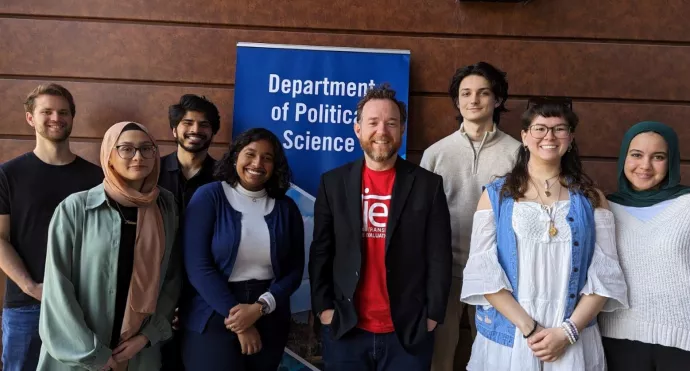
UTM students lead efforts to understand justice in global conflicts
As the war in Ukraine grinds on, the international community debates how to hold Russian president Vladimir Putin and his followers accountable for war crimes, whenever the opportunity arises. This issue falls within the scholarly field of "transitional justice," which confronts how to pursue accountability for human rights violations in the context of authoritarianism and violent political conflict.
A group of students at the University of Toronto Mississauga are at the forefront of efforts to understand transitional justice across the globe. These nine students — who work for political science professor Geoff Dancy — collect data on criminal prosecutions, truth commissions, legal amnesties, and reparations policies in all the regions of the world.
Dancy, post-doctoral researcher Oskar Timo Thoms, and the group of undergraduate students are sponsored by a $3 million grant from Global Affairs Canada, which is administered jointly between Harvard University and the U of T. The project is called Transitional Justice Evaluation Tools, or TJET.
The goal of the project, according to fourth-year student Pedro Andrade from Brazil, is “to provide a comprehensive database for academic research, and to predict human rights trends internationally.”
As a group, the UTM student researchers have developed a wide range of expertise during their time with TJET.
Mary Kazek has become a go-to authority on criminal proceedings against Chilean military and intelligence officers who were responsible for extensive human rights violations during the Pinochet regime. Collecting data on over 500 prosecutions has given Kazek an appreciation for detailed research: “Political science tends to focus on the macro level and gloss over the details of atrocities and human rights violations, which prevents people from fully understanding the true horrors of what has happened.”
Third-year student Fatimah Ahsan has helped finalize an exhaustive database of over 80 truth commissions that were established in the last 50 years. This includes Canada's Truth and Reconciliation Commission, which completed its work in 2015. “I personally enjoy how much I am able to learn about the cases,” Ahsan said. “Every case I code, I learn something about the country I am working on, including its history and political state.”
Other students are focused less on specific mechanisms of justice, and more on themes. Farah Radwan has spent months studying prosecutions of state agents for sex- and gender-based violence. She has combed through information on over 17,000 accused rights violators. “I think the biggest thing I learned while working on this project is that the workload can seem daunting, and it is really time-consuming — but it is extremely rewarding and fulfilling when it’s done, and it’s done right. I feel connected to the project.”
Indeed, the work is very detail-oriented, which the researchers find challenging at times but enjoyable. Nicole Fernando has excelled in the practice of coding, or converting publicly available information into useable data. “I love the methodical nature of coding. There is a process to follow for examining each case.”
In addition to learning that social science can be, as Ahsan describes it, “meticulous” and concerned with “accuracy,” it can also help with time management and organizational skills, as many of the students explained.
But the job of researching with TJET is not all nose to the grindstone. It also involves regular group meetings and team hangouts on the fifth floor of the Maanjiwe nendamowinan building. “What has struck me the most in the TJET project,” says Joseph Mangin — a third-year student from France, who carefully sifts through news articles to collect data on amnesty laws — “is the team-oriented nature of the research. We regularly discuss with each other about our respective work, which gives us a better understanding of our contribution.”
Dancy migrated the TJET project from Tulane University in New Orleans when he moved to U of T last summer. Dancy gives each of his researchers coffee mugs that say “Researching justice, one cup at a time.”
He says he’s very pleased with the students he chose to contribute to the project. “Not to diminish the work of other teams I’ve led, but this is probably the most joyful and committed group of students I’ve ever worked with. They have made my move to Toronto much easier.”
On May 3, Dancy, along with his colleagues at Harvard, presented findings from the data collection to Global Affairs Canada in Ottawa. “All of the hard work the students have done, Dancy said, “directly informed high-level policy conversations about how to proceed with transitional justice in contexts such as Ukraine and Ethiopia.”
